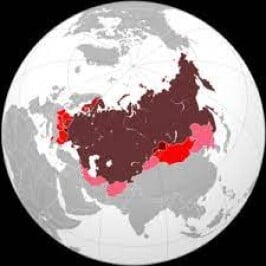
Undoubtedly, Vladimir Putin’s decision to invade Ukraine was a miscalculation. Nevertheless, many international observers were shocked when Russian tanks started to roll across the border despite mounting evidence that Putin would go through with it. Ostracizing his country from the Western liberal economies was incomprehensible to most. At the same time, it is all too easy to denounce his exploits as the work of a revisionist madman. Yes, Ukraine was once a part of the Soviet Union, and Putin certainly disdains NATO expansion, but there is an ideology underlying his seemingly erratic behavior. This year, the Russian Federation officially adopted Eurasianism as its foreign policy concept. A peculiar fusion of Russian imperialism and socialism, this socio-political dogma looks set to guide Russia’s role in the world for the remainder of Putin’s tenure. But what exactly is Eurasianism, and what geographical region even constitutes Eurasia?
In 1881, poet Fyodor Dostoevsky remarked of the Russians, “In Europe we were Tatars, whereas in Asia we, too, are Europeans.” After a series of political setbacks in Europe during the late 19th century, the Russian elite started to embrace the geographical and cultural isolation that the Western powers long looked down upon. Turning inwards and to the East for inspiration, many concluded that Russia is neither European nor Asiatic but rather a unique conglomeration of the two. This shift in mentality marked a departure from the Westernization process initiated by Peter the Great and laid the foundation of Eurasianism.
In its earliest form, the ideology emerged as an alternative to Bolshevism, developed in exile by White Russian émigrés who fled the 1917 October Revolution. However, the philosophy gained little traction, and it was not until the fall of the Soviet Union that it resurfaced. That collapse, which Putin called “the greatest geopolitical catastrophe of the century,” left an ideological void in Russia for the first time in its history. “Each stage had its own ideology,” said the recently reelected President Boris Yeltsin in 1996, but now, he continued, “We have none.” Unquestionably, this period of political disorientation played a pivotal role in Putin’s psychological development, who remained determined to restore meaning to the Russian government and the place it once held in the world.
The 2023 foreign policy concept designates Russia as a “Eurasian and Euro-Pacific power.” In the Kremlin’s eyes, Eurasia includes, at a minimum, all the former territories of the Soviet Union. By virtue of geography and historical destiny, Russia sees itself as the region’s predominant power, asserting its rightful sphere of influence. Moreover, the concept characterizes Russia as a “country-civilization” with unique values, morals, and historical mission. Consequently, the country cannot be evaluated or understood through the Western lens of liberal democracy. According to the document, this mission is to maintain the global balance of power and foster a multipolar international system. In practice, this aspiration reflects the long-held Eurasianist goal of positioning Russia as an alternative center of power, distinct from the West and Asia. Reminiscent of the USSR’s lost international prominence, Putin envisions his country as the future military-political nucleus of the non-Western world. As expected, this vision and so-called historical mission are inseparable from his desire to erode America’s global influence.
Thus, it probably comes with little surprise that today’s Eurasianists are vehemently anti-Western, particularly against the U.S. and its associated values. America is portrayed as the archetypal nemesis, imposing its democratic norms and way of life on the world. In contrast, Eurasianists are fiercely traditional and religious, at least in principle, maintaining a quasi-spiritual outlook. They perceive a West suffering from intellectual and societal decay, forsaking its Christian values. Following decades of suppression under the Soviets, the Russian Orthodox Church has regained its influential role in society and consistently supported Putin’s imperialist inclinations. Like the Moscow Patriarchate, autocratic traditions run deep in Russian history, with Putin the latest in a long line of absolutists. Eurasianists contend that democracy is dangerous, individualistic, hedonistic, and antithetical to the country’s political foundations.
In retrospect, Putin’s speech at the 2007 Munich Security Conference made it perfectly clear that his patience with the West and its rules-based order was starting to run thin. Unfortunately, European and American leaders dismissed it as a one-off tirade, believing the Russian threat died with the Soviet Union never to rise again. Nearly 17 years later, U.S.-Russian relations are as strained as they were at any point during the Cold War.
While a complete rapprochement between Moscow and the West appears exceptionally elusive, Eurasianism offers a glimpse of how future Russian foreign policy might unfold. To be sure, Putin remains a pragmatic opportunist subservient to no ideology. However, given the rupture between his country and the West, Eurasianism provides a rationale for his diplomatic reorientation to Southeast Asia. This shift is already evident, with China and India purchasing oil at discount rates while supplying goods targeted by Western sanctions to Russia. In the first seven months of 2023, Beijing’s total trade with Moscow increased 36% from a year before. Beyond expanding economic ties, Putin’s activities abroad signal a clear intent to challenge the existing order, supposedly in an attempt to fulfill its historic mission as the facilitator of global multipolarity. Whether it is pushing for the rapid expansion of BRICS or courting dictators in the Middle East, the essence of this guiding doctrine appears centered on diminishing American influence at every available opportunity. Serving as the bridge between Asia and Europe, the successful realization of Eurasianist thought in Russia hinges on its dominance of the near abroad, a harsh lesson that the Ukrainian people are tragically experiencing. The prospects of Putin restoring Russia’s place in the world are doubtful, but one thing is certain: his Eurasianist principles ensure that his country will not go down without a fight.